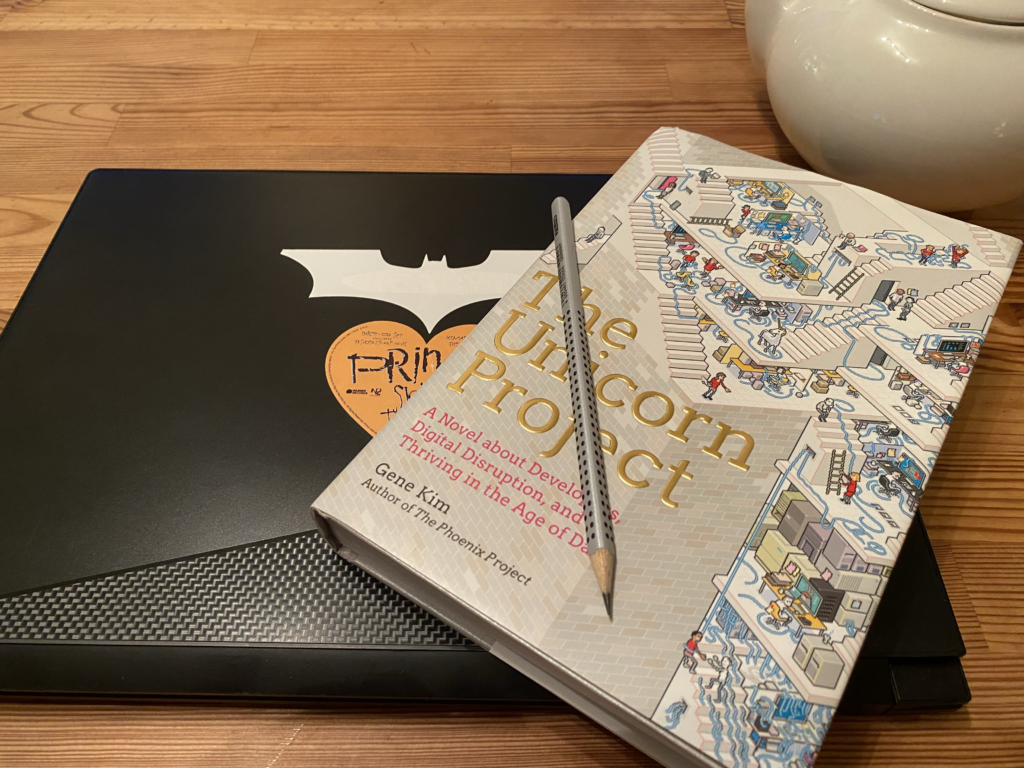
#devops #agile #lean
Subtitle: A Novel about Developers, Digital Disruption, and Thriving in the Age of Data
Authors: Gene Kim
Bought: 30 July 2020
Another book from Gene Kim, The Unicorn Project continues to promote DevOps and agile methods as the solutions to the world’s IT (and corporate) ills, similar to the other books by the author. Besides The Phoenix Project, Gene Kim is known (at least) for The DevOps Handbook and Accelerate (written together with Nicole Forsgren and Jez Humble).
The book re-uses the novel format introduced by The Phoenix Project to trace the archetypal trajectory of a DevOps transformation—the enterprise being the fictional “Parts Unlimited” company (another reference to The Goal?)—a company that displays all the evils of a big “legacy company” in which words like ITIL and TOGAF have replaced the beating entrepreneurial heart and poisoned the spirit of the good IT people (/insert sad violin/).
The book is split into three parts:
- Part 1 (Chapter 1 – Chapter 7) presents the state of crisis in which “Parts Unlimited” finds itself: losing market share, an IT culture dominated by bureaucracy in which the actual IT specialists (Dev, Ops, QAs) have become mindless zombies accepting the absurdity of corporate decay: infinite request chains, roadblocks, pervasive blame games, etc. In these dark times, there is a light of hope: a few engineers that have refused to sell out their dreams and that are organizing “the resistance” to defend IT ideals.
- Part 2 (Chapter 8 – Chapter 13) shows the resistance becoming visible and being embraced by (some) management; the new hope spreads.
- Part 3 (Chapter 14 – Chapter 19) depicts the final battle and the happy aftermath.
The DNA of the change (and of the perfect organization) consists of “The Five Ideals”:
- Locality and Simplicity
- Focus, Flow, and Joy
- Improvement of Daily Work
- Psychological Safety
- Customer Focus
What shocked me is the total dedication that the Devs, Ops, and QAs have to this failed company: Maxine and her co-conspirators spend almost 100% of their (diminished) waking hours working to transform Parts Unlimited, to take responsibility for production deployments, to set up (in rogue mode) servers and deployment processes alike. Maxine’s family is presented as a passive background actor: something that is happening around her while she toils at the corporate laptop to improve the corporation’s IT.
The story brushes off, without much consideration, the security and compliance implications of direct production deployment by the DevOps team. It minimizes the human and logistic cost of operating and supporting high availability services: in The Unicorn Project, the DevOps team is happy to take responsibility for maintaining and supporting the services themselves—no worry for the on-call requirements, for wearing a pager (without any compensation).
In the end, the “rogue” aspect of the corporate transformation and especially its dependency on the employees’ readiness for seemingly endless sacrifice of self and of family time is the most puzzling and self-defeating aspect of the (assumed) objective of promoting the DevOps transformation path.
On one side, it makes the whole story less relevant to anybody looking for ways to start on the DevOps transformation path: any change is viable if you have access to the best people and if these people are willing to provide you endless time and effort… but this is never the case. In my experience, in a company like “Parts Unlimited,” you’ll soon discover that the best people have already left; those that stay around are mainly there because they have concluded that the way things are is… acceptable for some reason: job security, predictability, etc.
On the other side (and in my view, this is the worst part of The Unicorn Project): this is not needed. The “DevOps transformation” is possible by setting clear intermediary steps—steps that have an immediate advantage for the people involved and the company (e.g., fewer incidents in production, thus less personal impact).
By clear communication of the thinking behind the decisions, transparent tracking of the results to grow confidence, and by showing the team a sustainable path towards balancing private life and professional excellence, you don’t need a war—you need diplomacy, leadership, and knowing what you are doing.

